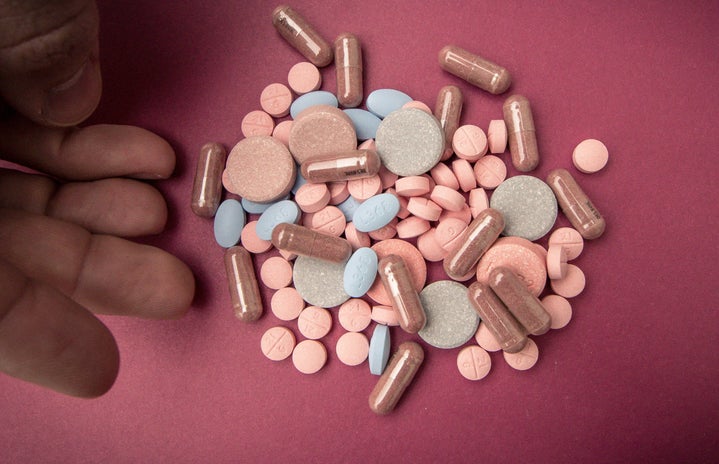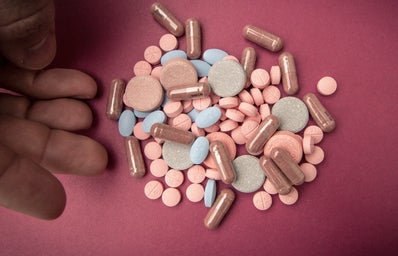Trigger Warning: This article mentions substance abuse.
I used to do a little but a little wouldn’t do
So the little got more and more
I just keep tryin’ to get a little better
Said, a little better than before
We been dancin’ with
Mr. Brownstone
He’s been knockin’
He won’t leave me alone
No no no
He won’t leave me alone.
Guns N’ Roses [Mr. Brownstone]
This song is about how heroin affected the band, Guns N’ Roses. Mr. Brownstone is likely to be their dealer. Brownstone isn’t a common slang term for heroin, but it is brown, which is likely to be where the dealer got his name from. While opening for The Rolling Stones at a show in Los Angeles on October 18th, 1989, Axl Rose said on stage: “Unless certain people in this band get their sh*t together, these will be the last Guns N’ Roses shows you’ll f*cking ever see. Cause I’m tired of too many people in this organization dancing with Mr. G*ddamn Brownstone.” It apparently got the attention of his bandmates, as Slash, Izzy Stradlin, and Steve Adler promised to clean up.
The 60s-90s rock scene was a flourishing time for drugs. Bands such as GNR breaking up, or the the 27 Club, mental and physical health, creative impact, and legal issues left a lasting imprint on popular culture. It became synonymous with the rebellious, countercultural ethos of rock music, influencing fashion, language, and societal norms.
However, it also perpetuated harmful stereotypes and misconceptions about drug use and addiction and the effects of the drug abuse problem within the rock scene from the 1960s to the 1990s continue to reverberate in various ways today.
The purpose of this article is to highlight how an addiction manifests itself to erode a human being’s life. If you, or someone you know might have any addiction, this can help identify and just push one towards finding professional help.
Trigger Warning: The following paragraphs mention substance abuse in detail and may be triggering for some audiences.
Drug experimentation or recreational usage is frequently the first step towards drug use. Curiosity, peer pressure, or the desire for enjoyable experiences could be the cause of this. At this point, drug usage may be sporadic or occasional, and people may not yet exhibit symptoms of addiction. The body may grow tolerant to the drug’s effects with prolonged use. This indicates that in order to get the desired results, greater doses are required. To get the same high, people can start taking bigger doses or using the drug more frequently. People may get more obsessed with getting and using drugs as their tolerance grows. They might ponder over drugs for a long time, make plans for getting them, and then use them. This preoccupation inherently interferes with other aspects of life and results in even the loved ones feeling detached and possibly giving up. Work-life and such are obvious ramifications.
One of the hallmark signs of addiction is the loss of control over drug use. Even with detrimental effects, some nevertheless struggle to control or quit using drugs. Even when they wish to stop using drugs, they might not be able to stop compulsively. When someone stops using a drug or cuts back on their dosage, they may experience withdrawal symptoms due to physical dependence. Depending on the substance, withdrawal symptoms could differ, but they can include sweating, shaking, nausea, vomiting, anxiety, and irritability. People may continue using drugs in an attempt to avoid or lessen these uncomfortable symptoms.
Addiction frequently has a negative impact on one’s health, relationships, income, and legal situation, among other aspects of life. People could however put drug usage ahead of other obligations and objectives in spite of these negative effects. People may grow disinterested in past interests and pastimes as their addiction worsens. They might stop interacting with people and disregard their responsibilities at home, at work, or at school. Even when they are aware of the harmful effects of their drug usage, addicts may find it difficult to get clean or get treatment. This is brought on by the compulsive nature of addiction and the alterations in the reward system of the brain.
To avoid drugs, get knowledge about the dangers and repercussions of using them as your first priority, surround yourself with supportive people, and create healthy coping strategies for stress and emotions. Establish clear guidelines for drug usage, stay away from high-risk environments when drugs are available, and concentrate on boosting your confidence and self-worth so you can fend off peer pressure. Maintain your involvement in worthwhile pursuits, ask for help when you need it, and give self-care for your physical and emotional health first priority. You can maintain a drug-free lifestyle and make decisions that are consistent with your values and objectives by being proactive and remaining informed.
The National Toll-Free Helpline to assist alcoholic and drug-dependent persons is (1800-11-0031).


